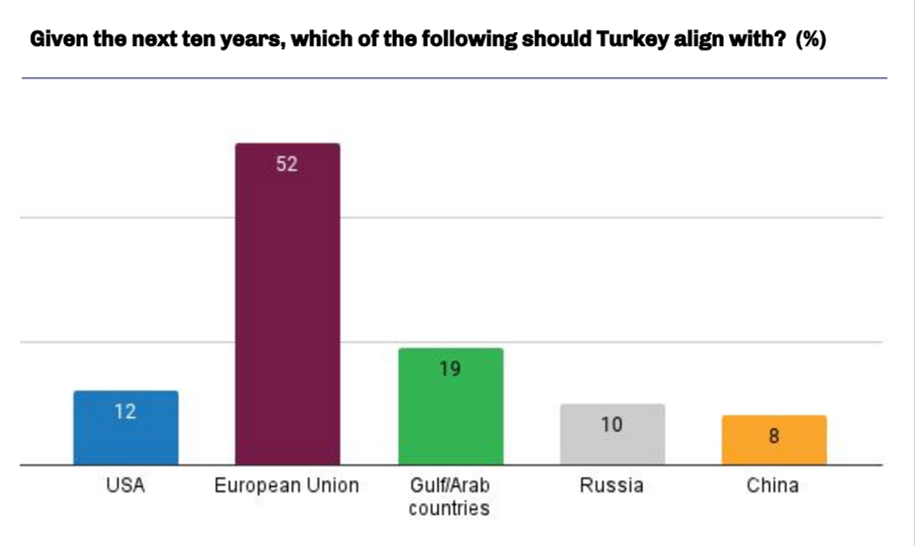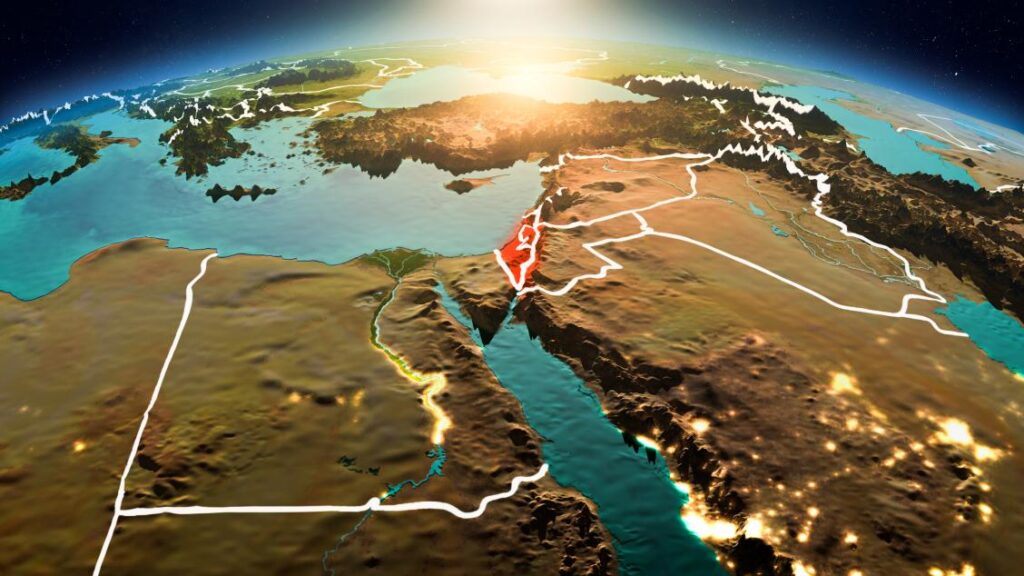Which Country Should Turkiye Align With?

By Turkiye Report
March 2022
In our March survey, we asked participants which state Turkey should develop close ties with at the international arena, which has now entered a very challenging period with the Ukraine occupation. The majority of participants (52%) stated that Turkey should approach the European Union. The EU was followed by the Gulf/Arab countries, with 19% of participants suggesting better relations. While 12% said Ankara should approach Washington, Russia (10%) and China (8%) are the countries the society least prefers as partners in foreign policy. The findings suggest that the majority of society wants Turkey to turn its face toward Europe, as it did in the late 1990s and early 2000s. However, the Arab and Gulf countries, which come second, may have been chosen because they were seen as an alternative to our close oil and gas partnership with Russia. Economic sanctions against Russia and high oil prices have also pushed Western countries to establish new partnerships in the energy field. In this context, U.S. President Biden has requested a meeting with the leaders of the United Arab Emirates (UAE) and Saudi Arabia, but his request was denied. Finally, 10% of the respondents felt that we should approach Russia, while the rate of those who want to build a good relationship with China was 8%. It is difficult to predict whether those who want to develop closer ties with Russia and China made this choice because of economic concerns or because of an anti-Western Eurasian motivation.
In shaping the foreign policy agendas of states, domestic politics and the ideologies adopted by governments play an important role, as do international dynamics. When we look at Turkey’s political history, we see that governments give priority to engaging with certain states. During the single-party regime, Turkey turned to Europe both as a counterweight to the Soviet Union and in accordance with Kemalist principles that set an example of European states on the road to civilization. However, the Democratic Party, which came to power in 1950, gave priority to the United States, which is believed to be the superpower in the new world order, and not to Europe, which had been destroyed by the Second World War, when determining its foreign policy. The most concrete example of U.S.-Turkish rapprochement was Turkey’s joining NATO in 1952.
The collapse of the Soviet bloc and the creation of the European Union in the early 1990s marked a new era in the world order. Turkey’s relations with the EU remained positive from the late 1990s to the mid-2000s. At the Helsinki summit in 1999, Turkey was granted candidate status, and at the Brussels summit in December 2004, negotiations were initiated. It can be said that the AK Party’s foreign policy centered on EU membership satisfied the Kemalist wing of the military and the bureaucracy during this period. However, the year 2011 brought signals of a change in the foreign policy of the AK Party. The AK Party government, which has consolidated its power in domestic politics, started to follow a more aggressive foreign policy by distancing itself from the West, beginning from the Mavi Marmara crisis in 2010.
In this context, the AK Party has approached Turkish nationalists and Eurasists in domestic politics in order to maintain the political balance. Eurasist thinking, which has its roots in the radical left movement in Turkey, is opposed to any rapprochement with “imperialist” Western countries and sees Turkey’s interests in forming an anti-imperialist pole with China and Russia.
In January 2013, Erdogan’s declaration that he would give up Turkey’s EU candidacy in return for becoming a member of the Shanghai Cooperation Organization was the first signal of a shift in foreign policy direction. Since 2014, the influence of nationalist, anti-Western and Eurasian movements in foreign policy has become increasingly evident. During the 2016 coup attempt, the first foreign leader to call Erdogan was Vladimir Putin. Erdogan also purchased the Russian-made S-400 air defense system after failing to reach an agreement with the United States for the Patriot system. The military operation launched by Russia against Ukraine on the morning of February 24 marks the beginning of a critical period in the foreign policy of Turkey, which is both a NATO ally and has close relations with Russia and Ukraine. Turkey intends to play a mediator’s role by following a policy of balance. The invasion of Ukraine seems to have created a new and legitimate basis for Ankara to redefine its priorities in its relations with its Western allies.





